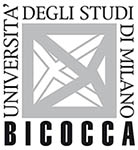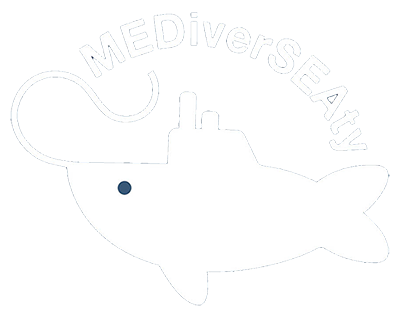University of Milano-Bicocca
Posts of Full-time Research Support Officer (PhD Student)

1. Applications are invited for ONE full-time Early-Stage Researcher (PhD candidate) on the grant “In quest of the human dimensions of MEDiterranean Marine Biodiversity” (MEDiverSEAty). This project has received funding from the European Union’s Horizon Europe programme under the Marie Skłodowska-Curie grant agreement No 101119700. For further information on the Marie Curie schemes and eligibility please visit:
http://ec.europa.eu/research/mariecurieactions/actions/research-networks_en
Further information on the MEDiverSEAty project is available at http://mediverseaty.eu
2. Applicants must be in possession of Master’s degree or equivalent in an area of study related to the proposed area of research and ideally in one of the following areas: island and small states studies, biology, ecology, marine sciences, human geography, sustainable marine resources management, marine conservation gender studies and any other area deemed appropriate by the selection board. Applicants are required to be in possession of appropriate qualifications to demonstrate excellent skills in English, and excellent scientific writing skills.
3. Applicants must comply with the following Marie Curie Grant rules.
- H2020 MSCA Mobility Rule: Candidates must not have resided or carried out their main activity (work, studies, etc.) in the country of the host organisation for more than 12 months in the 3 years immediately prior to the recruitment date. Compulsory national service, short stays such as holidays, and time spent as part of a procedure for obtaining refugee status under the Geneva Convention will not be taken into account.
- H2020 MSCA ESR eligibility criteria: Candidates must be, at the date of recruitment by the host organisation, in the first four years (full-time equivalent research experience) of their research careers and have not been awarded a doctoral degree. Full-Time Equivalent Research Experience is measured from the date when the researcher obtained the degree entitling him/her to embark on a doctorate (either in the country in which the degree was obtained or in the country in which the researcher is recruited, even if a doctorate was never started or envisaged).
4. Throughout the programme (36 months) the appointed candidate will be enrolled as PhD students at the University of Milano-Bicocca (Doctoral Program in Marine Sciences, Technologies and Management https://en.unimib.it/education/postgraduates/doctoral-research-phd-programmes/phd-programmes/marine-sciences-technology-and-management-mtm) and hosted by Stazione Zoologica Anthon Dorn. The selected candidate might opt to be seconded to one of the research locations agreed by the MEDiverSEAty project consortium, for which length of stay and location shall be agreed and endorsed by the supervisory team of the Early-Stage Researchers (PhD candidate). The candidates will also be expected to attend a number of multidisciplinary research-related scientific courses as well as summer schools, winter schools and skills workshops. These will be organised by the MEDiverSEAty project partners.
5. The successful candidates will be expected to work forty hours per week for a definite period of three years. The post carries a monthly salary of €3300,00. The candidates are also eligible for mobility allowance of €600/month and, where applicable at the time of application, a family allowance of €660/ month.
- The mobility allowance covers the costs related to the mobility of recruited researchers, such as travel and accommodation. This allowance covers only personal costs incurred by researchers (as opposed to costs linked to professional activities which are covered under the contribution for research, training and networking).
- The family allowance aims to compensate additional costs due to family obligations.
6. The candidates must work exclusively for the project during the employment contract. The candidates must fulfil the conditions to be admitted in the PhD programme indicated in the Job Vacancy.
7. Candidates should submit the following to https://forms.gle/538rmdiLQ5vkwNnf7:
- A Curriculum Vitae, including their skills and educational and career trajectory and their place of residence and place of main activities (work, studies, etc.) in 3 preceding years (maximum 3 pages, font 11 or higher).
- University Qualification transcripts (grades).
- A statement letter addressing your research interests in relation to the specific research project “In quest of the human dimensions of MEDiterranean Marine Biodiversity” offered by UNIMIB.
- The name and contact details of two referees who can comment on your skills, experience, and suitability for postgraduate research (referees will only be contacted for candidates invited to interview).
- A one-page outline of the proposed research questions, approach and research design of your PhD project building on the project description offered by UNIMIB.
Applications should be received by not later than 31st May 2024. Below is the tentative recruitment process timeline:
- Interviews: 4-6 June 2024 (online);
- Final results: by the end of June 2024;
- Contract starting day: 1 October 2024 (total duration 36 months);
- PhD Enrolment: 1 November 2024.
8. Further information may be obtained from and should you have any queries, please send us an email on [email protected], [email protected].
1. Coordinated by the UNIVERSITÀ DEGLI STUDI DI MILANO-BICOCCA (UNIMIB), MEDiverSEAty is a transnational project based on several local case studies with the aim of filling these gaps, through the implementation of a Doctoral Network Training and Research Program in 6 European countries (IT, ES, FR, EL, ME, MT), a novelty in the educational and scientific panorama of marine science and biodiversity management. MEDiverSEAty develops an international, interdisciplinary and inter-sectoral Training Program for 10 PhD Candidates who, in a medium-term perspective, will form a community of early career researchers trained in the study of marine biodiversity, via joint research projects in both academic and non-academic settings, with local and network training, open science and complementary skills. The project is based on two key pillars of contemporary marine sciences, policies and education, with an interdisciplinary approach that tackles the barriers that continue to exist among the biological sciences, the humanities and social sciences, and the study of environmental governance: Ocean Literacy and Marine Biodiversity Conservation. The scientific research objectives of MEDiverSEAty are to develop a common theoretical framework of Mediterranean Marine Biodiversity Conservation which integrates human and biological dimensions and implications, to foster the crucial role of human dimensions in the protection and conservation of Marine Biodiversity and to make Biodiversity the focus of Mediterranean Ocean Literacy. Further information may be obtained by contacting [email protected] and [email protected].
2. Successful candidates will be hired as Early-Stage Researcher (PhD candidate). The successful candidate will be enrolled will be enrolled as PhD students at the University of Milano-Bicocca (Doctoral Program in Marine Sciences, Technologies and Management: https://en.unimib.it/education/postgraduates/doctoral-research-phd-programmes/phd-programmes/marine-sciences-technology-and-management-mtm) and hosted by Stazione Zoologica Anthon Dorn. The candidates will be expected to:
- perform independently scientific research within a collaborative international research consortium;
- deliver written reports of your research on a regular basis;
- prepare a doctoral thesis on the topic of solidarity in diversity;
- publish scientific articles related to the research project;
- support the valorization of research results into tangible deliverables;
- participate in, and contribute to, scientific meetings and conferences, presenting your research to the scientific community;
- actively participate in outreach activities aimed at promoting your research to a wider audience;
- collaborate with the other members of the consortium to advance your research and training;
- participate in the tailor-made training programme;
- The selected candidate might opt to be seconded to one of the research locations agreed by the MEDiverSEAty project consortium, for which length of stay and location shall be agreed and endorsed by the supervisory team.
3. Applicants that are not native English speakers must provide proof of their English language proficiency as established through an internationally recognized qualification.
4. The selection procedure will involve:
a. scrutiny of qualifications and experience claimed and supported by testimonials and/or certificates (copies to be included with the application);
b. shortlisting; and;
c. an interview and / or extended interview;
Project Title
Managing the protection of marine biodiversity through ecosystems services approaches: implication on marine and coastal tourism. A gender perspective.
Objectives
Managing the protection of marine biodiversity by adopting ecosystem services approaches is a strategy offering two positive feedback on human systems. 1. It minimises the conflicts among users (tourists, operators, fishers, administrators) 2. It promotes the integration of tourism and environmental protection Furthermore, in the perspective promoted by MEDiverSEAty, these positive implications may foster the relevance of human dimensions involved in environmental policies. Several connections emerge with two objects: a. tourism, and b. women’s inclusion in the blue jobs market (fisheries, environmental management, pescatourism, environmental education). In fact, the integration of tourism in the protection of ecosystems and the enhancement of women’s employment in the pivotal sectors of the blue economy are key objectives of European policies for the Mediterranean (ERDF, Blue Growth). The project aims at investigating this background statements by fieldworks in Marine Protected Areas in Sicilian and Spanish Archipelagos (Aeolian and Balearic Islands) and coastal areas highly impacted by seasonal tourism.
The research will address two themes:
- the study of strategies to enhance the protection of marine ecosystems in tourism;
- the empowerment of women inclusion in “blue jobs market” related to environmental protection and sustainable tourism.
During the first year the successful candidate will attend the scientific courses organised by the doctoral program at the University of Milan-Bicocca as and other courses that the tutor and the doctoral committee will deem necessary to expand the theoretical, methodological and empirical baseline of the research.
Expected Results
The research will be conducted by a mixed method approach. The expected output are:
Inventory and mapping (in the selected sites) of the existing biodiversity conservation strategies. Inventory of the associated ecosystem services. Survey on female involvement in the blue job market. Knowledge transfer (translational ecology) during the implementation of the project through stakeholders (several target groups) engagement activities (e.g. interviews, focus groups, seminars). Guidelines to enhance sustainable tourism practices in marine protected areas.


